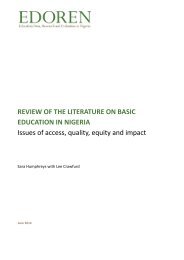review-of-the-literature-on-basic-education-in-nigeria-june-2014-3-1
review-of-the-literature-on-basic-education-in-nigeria-june-2014-3-1
review-of-the-literature-on-basic-education-in-nigeria-june-2014-3-1
Create successful ePaper yourself
Turn your PDF publications into a flip-book with our unique Google optimized e-Paper software.
Review <str<strong>on</strong>g>of</str<strong>on</strong>g> <str<strong>on</strong>g>the</str<strong>on</strong>g> <str<strong>on</strong>g>literature</str<strong>on</strong>g> <strong>on</strong> <strong>basic</strong> educati<strong>on</strong> <strong>in</strong> NigeriaExecutive summaryBackgroundInitially commissi<strong>on</strong>ed by <str<strong>on</strong>g>the</str<strong>on</strong>g> DFID-funded programme Educati<strong>on</strong> Data, Research and Evaluati<strong>on</strong> <strong>in</strong>Nigeria (EDOREN) to <strong>in</strong>form its operati<strong>on</strong>al research stream, this <str<strong>on</strong>g>literature</str<strong>on</strong>g> <str<strong>on</strong>g>review</str<strong>on</strong>g> has now beenexpanded and is aimed at nati<strong>on</strong>al and <strong>in</strong>ternati<strong>on</strong>al audiences, as well as at readers both familiar andunfamiliar with <strong>basic</strong> educati<strong>on</strong> issues <strong>in</strong> Nigeria. The <str<strong>on</strong>g>review</str<strong>on</strong>g> is designed to <strong>in</strong>form <str<strong>on</strong>g>the</str<strong>on</strong>g> work <str<strong>on</strong>g>of</str<strong>on</strong>g>government <str<strong>on</strong>g>of</str<strong>on</strong>g>ficers <strong>in</strong>volved <strong>in</strong> <strong>basic</strong> educati<strong>on</strong> – both policy-makers and implementers at federal, stateand Local Government Educati<strong>on</strong> Authority (LGEA) levels – c<strong>on</strong>sultants work<strong>in</strong>g <strong>on</strong> educati<strong>on</strong>aldevelopment projects, and academics work<strong>in</strong>g <strong>in</strong> <str<strong>on</strong>g>the</str<strong>on</strong>g> field <str<strong>on</strong>g>of</str<strong>on</strong>g> <strong>basic</strong> educati<strong>on</strong>. In particular, <str<strong>on</strong>g>the</str<strong>on</strong>g> <str<strong>on</strong>g>review</str<strong>on</strong>g>exam<strong>in</strong>es <str<strong>on</strong>g>the</str<strong>on</strong>g> f<strong>in</strong>d<strong>in</strong>gs <str<strong>on</strong>g>of</str<strong>on</strong>g> empirical studies from between 2000 and 2013 that relate to factors affect<strong>in</strong>geducati<strong>on</strong>al access, quality, equity and impact <strong>in</strong> <strong>basic</strong> educati<strong>on</strong>. It also c<strong>on</strong>siders related grey <str<strong>on</strong>g>literature</str<strong>on</strong>g>and policy documents. Most <str<strong>on</strong>g>of</str<strong>on</strong>g> <str<strong>on</strong>g>the</str<strong>on</strong>g> <str<strong>on</strong>g>literature</str<strong>on</strong>g> refers to public primary educati<strong>on</strong>, predom<strong>in</strong>antly <strong>in</strong>nor<str<strong>on</strong>g>the</str<strong>on</strong>g>rn Nigeria, with an emphasis <strong>on</strong> girls’ educati<strong>on</strong> s<strong>in</strong>ce this has been <str<strong>on</strong>g>the</str<strong>on</strong>g> focus <str<strong>on</strong>g>of</str<strong>on</strong>g> recentdevelopment efforts, which have produced most <str<strong>on</strong>g>of</str<strong>on</strong>g> <str<strong>on</strong>g>the</str<strong>on</strong>g> available documents.As well as pull<strong>in</strong>g toge<str<strong>on</strong>g>the</str<strong>on</strong>g>r some <str<strong>on</strong>g>of</str<strong>on</strong>g> <str<strong>on</strong>g>the</str<strong>on</strong>g> <strong>in</strong>sights from <str<strong>on</strong>g>the</str<strong>on</strong>g> available <str<strong>on</strong>g>literature</str<strong>on</strong>g>, <str<strong>on</strong>g>the</str<strong>on</strong>g> <str<strong>on</strong>g>review</str<strong>on</strong>g> aims to identify<str<strong>on</strong>g>the</str<strong>on</strong>g> gaps <strong>in</strong> <str<strong>on</strong>g>the</str<strong>on</strong>g> research – both substantive and methodological – and po<strong>in</strong>t to ways <strong>in</strong> which we might<strong>in</strong>crease our knowledge.The drive to improve <str<strong>on</strong>g>the</str<strong>on</strong>g> quality <str<strong>on</strong>g>of</str<strong>on</strong>g> <strong>basic</strong> educati<strong>on</strong> <strong>in</strong> Nigeria has been given tremendous impetus over<str<strong>on</strong>g>the</str<strong>on</strong>g> last decade. Examples <str<strong>on</strong>g>of</str<strong>on</strong>g> <str<strong>on</strong>g>the</str<strong>on</strong>g> Nigerian government’s commitment to improvement <strong>in</strong>clude: <str<strong>on</strong>g>the</str<strong>on</strong>g>expansi<strong>on</strong> <str<strong>on</strong>g>of</str<strong>on</strong>g> compulsory educati<strong>on</strong> from primary level to junior sec<strong>on</strong>dary level <strong>in</strong> <str<strong>on</strong>g>the</str<strong>on</strong>g> 2004 UniversalBasic Educati<strong>on</strong> (UBE) Act, and <str<strong>on</strong>g>the</str<strong>on</strong>g> subsequent revised nati<strong>on</strong>al policy <strong>on</strong> educati<strong>on</strong>; <str<strong>on</strong>g>the</str<strong>on</strong>g> apparent<strong>in</strong>crease <strong>in</strong> <str<strong>on</strong>g>the</str<strong>on</strong>g> number <str<strong>on</strong>g>of</str<strong>on</strong>g> children access<strong>in</strong>g sec<strong>on</strong>dary educati<strong>on</strong>; <str<strong>on</strong>g>the</str<strong>on</strong>g> establishment <str<strong>on</strong>g>of</str<strong>on</strong>g> <str<strong>on</strong>g>the</str<strong>on</strong>g> UniversalBasic Educati<strong>on</strong> Commissi<strong>on</strong> (UBEC) with its associated advisory and fund<strong>in</strong>g mechanisms; susta<strong>in</strong>edcollaborati<strong>on</strong> with <strong>in</strong>ternati<strong>on</strong>al development partners (IDPs) such as DFID, UNICEF and USAID; <str<strong>on</strong>g>the</str<strong>on</strong>g>fund<strong>in</strong>g <str<strong>on</strong>g>of</str<strong>on</strong>g> a major collecti<strong>on</strong> <str<strong>on</strong>g>of</str<strong>on</strong>g> studies <strong>in</strong> a wide-rang<strong>in</strong>g <str<strong>on</strong>g>review</str<strong>on</strong>g> <str<strong>on</strong>g>of</str<strong>on</strong>g> <strong>basic</strong> educati<strong>on</strong> <strong>in</strong> 2004; and <str<strong>on</strong>g>the</str<strong>on</strong>g>more recent establishment <str<strong>on</strong>g>of</str<strong>on</strong>g> a presidential task force <strong>on</strong> educati<strong>on</strong> <strong>in</strong> 2011. In additi<strong>on</strong>, through arange <str<strong>on</strong>g>of</str<strong>on</strong>g> government <strong>in</strong>itiatives, <str<strong>on</strong>g>the</str<strong>on</strong>g>re has been susta<strong>in</strong>ed effort at improv<strong>in</strong>g equity and widen<strong>in</strong>gparticipati<strong>on</strong> <strong>in</strong> educati<strong>on</strong>, <strong>in</strong> particular <strong>in</strong>creas<strong>in</strong>g access to <strong>basic</strong> educati<strong>on</strong> am<strong>on</strong>g girls, nomadic andMuslim children. However, given <str<strong>on</strong>g>the</str<strong>on</strong>g> size and diversity <str<strong>on</strong>g>of</str<strong>on</strong>g> Nigeria, and <str<strong>on</strong>g>the</str<strong>on</strong>g> fact that <str<strong>on</strong>g>the</str<strong>on</strong>g> educati<strong>on</strong> sectoris still recover<strong>in</strong>g from its neglect dur<strong>in</strong>g <str<strong>on</strong>g>the</str<strong>on</strong>g> years <str<strong>on</strong>g>of</str<strong>on</strong>g> military dictatorships, huge challenges still rema<strong>in</strong>.It is unsurpris<strong>in</strong>g <str<strong>on</strong>g>the</str<strong>on</strong>g>n that, despite <str<strong>on</strong>g>the</str<strong>on</strong>g> significant achievements <strong>in</strong> <strong>basic</strong> educati<strong>on</strong>, such as thosementi<strong>on</strong>ed above, much <str<strong>on</strong>g>of</str<strong>on</strong>g> <str<strong>on</strong>g>the</str<strong>on</strong>g> research <str<strong>on</strong>g>literature</str<strong>on</strong>g> focuses more <strong>on</strong> what still needs to be d<strong>on</strong>e.1. GENERAL ISSUESThe unavailability, paucity and unreliability <str<strong>on</strong>g>of</str<strong>on</strong>g> available statistical data <strong>on</strong> educati<strong>on</strong>, especially asregards <str<strong>on</strong>g>the</str<strong>on</strong>g> Educati<strong>on</strong> Management Informati<strong>on</strong> System (EMIS), has made it difficult to plan and budgeteffectively for educati<strong>on</strong>, to collect mean<strong>in</strong>gful basel<strong>in</strong>e and evaluati<strong>on</strong> data, and to undertake largescalesurvey research.However, while most studies acknowledge <str<strong>on</strong>g>the</str<strong>on</strong>g> <strong>in</strong>adequacy <str<strong>on</strong>g>of</str<strong>on</strong>g> <str<strong>on</strong>g>the</str<strong>on</strong>g> statistical data, <str<strong>on</strong>g>the</str<strong>on</strong>g>y simultaneouslyuse <str<strong>on</strong>g>the</str<strong>on</strong>g>m as evidence <str<strong>on</strong>g>of</str<strong>on</strong>g> <str<strong>on</strong>g>the</str<strong>on</strong>g> positive impact <str<strong>on</strong>g>of</str<strong>on</strong>g> particular programmes. This problem <str<strong>on</strong>g>of</str<strong>on</strong>g> data quality isexacerbated by <str<strong>on</strong>g>the</str<strong>on</strong>g> <strong>in</strong>creas<strong>in</strong>g number <str<strong>on</strong>g>of</str<strong>on</strong>g> schools that may not be <strong>in</strong>cluded <strong>in</strong> government figures, suchas unregistered private schools and religious schools that may be teach<strong>in</strong>g some secular subjects.Inclusi<strong>on</strong> <str<strong>on</strong>g>of</str<strong>on</strong>g> data <strong>on</strong> over-age pupils, grade repetiti<strong>on</strong> and <strong>on</strong> pupil absenteeism as well as a robustdef<strong>in</strong>iti<strong>on</strong> <str<strong>on</strong>g>of</str<strong>on</strong>g> what c<strong>on</strong>stitutes ‘dropp<strong>in</strong>g out’ would be extremely useful.S<strong>in</strong>ce much <str<strong>on</strong>g>of</str<strong>on</strong>g> <str<strong>on</strong>g>the</str<strong>on</strong>g> empirical research is associated with development programmes, it has been driven byproject agendas, and has <str<strong>on</strong>g>the</str<strong>on</strong>g>refore primarily been evaluative and quantitative so as to enable outputsEDOREN – Educati<strong>on</strong> Data, Research and Evaluati<strong>on</strong> <strong>in</strong> Nigeriaii



